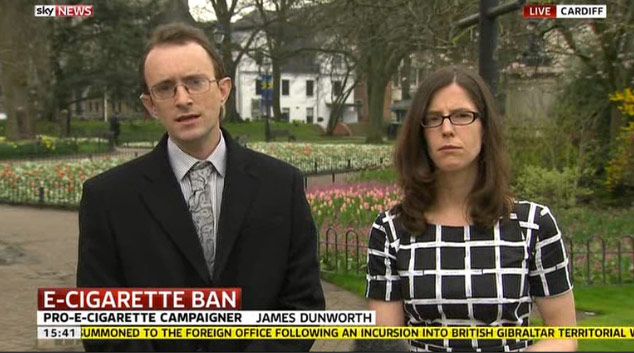
My hands were clammy, my throat was dry and my heart was pounding so hard it seemed to shake my whole body.
As I waited for the SKY TV camera to go live, I felt like I was staring down the barrel of a gun.
But despite being absolutely terrified, by the end of the interview I had won an aggressive interviewer round to our side.
The trick, I have found, is to know the topic incredibly well. We are not politicians with something to hide - we are in the right and when we have the facts to hand we can win any argument, even against more experienced debaters.
So if you are ever facing an interview, or even a pub debate, the following may help!The Interview
[caption id="" align="aligncenter" width="634"] Getting interviewed by Sky News in Cardiff.[/caption]
Getting interviewed by Sky News in Cardiff.[/caption]You are in the studio. The interviewer sneers at you as he begins.
Interviewer: Millions of people are using ecigs because they are convinced vaping is safe, but how we do know it is really safe in the longer term?
You: First let's clarify. E-cigarettes are not safe (nothing is 100% safe) - they are safer (see Smoke Without Fire? The Truth About Vaping Safety). Many scientists estimate they are around 100 times safer than cigarettes, with a similar risk level to caffeine.
David Sweanor made the comparison aptly when he pointed out:
Rather than the unattainable standard of ‘safe’ we should be thinking in terms of ‘safer’. Despite the risks associated with soccer, I would, for instance, prefer my children play soccer rather than play with live hand grenades.Interviewer: So, how do we know they are safer?
You: Firstly, science tells us that ecigs are safer. Smoking diseases are caused by combustion, but there’s no combustion in ecigs.
Secondly, all the principal ingredients in ecigs; propylene glycol, vegetable glycerine and nicotine, have been known for years, are well researched and are considered safe for inhalation.
Finally, a huge amount of studies have been carried out in the last couple of years, including studies on the effects of ecigs on the lungs, the heart and the blood stream. The results have been overwhelmingly positive.
Given this, are we really supposed to wait 40 years to see what happens to a small control group while tens of millions of smokers die? And if so, how we are ever going to approve ANY new product again?
Interviewer: Well sure, but aren’t electronic cigarettes leading people into smoking - or, as the Welsh government say, re-normalising smoking?
You: No, and we have the data to prove it! A survey by Action on Smoking and Health found that only 0.5% of vapers were non-smokers before trying ecigarettes.
Electronic cigarettes are not a gateway to smoking, they are an exit to smoking - so let’s not brick up the exit!
Interviewer: Now the Welsh government has proposed banning electronic cigarettes in public places. Even if they are safer, isn’t that a reasonable proposal? Why should non-smokers be exposed to vapour?
You: So you mean for the first time we should draft anti-smoking legislation to target non-smokers and people trying to stop smoking tobacco cigarettes?
Interviewer: Well, you could put it like that, but don’t you think it is a fair point?
You: No, I don’t. The smoking ban in public places would never have been successful if it wasn’t for the passive smoking issue.
Now, there are several studies that have shown that electronic cigarettes carry no risk of passive smoking. In fact, one study on how electronic cigarettes affected white blood cells found there was no effect on either non-users or users of electronic cigarettes - in stark contrast to tobacco cigarettes.
There’s no lingering smell.
So, there’s no health reason to ban ecigarette use in public. We’ve seen that ecigarettes are not leading people to smoking. But in Spain, where these regulations have been introduced, there’s been a 70% decrease in the sales of electronic cigarettes. That’s a huge number of people who are using tobacco cigarettes instead of electronic cigarettes which as we have discussed are vastly less harmful than smoking.
Interviewer: Okay, but isn’t it true ecigarette companies are marketing to children? After all, the flavours you are producing are attractive to children.
You: Actually, the industry has been way ahead of the government when it comes to protecting children. The Electronic Cigarette Industry Trade Association banned the sale of ecigs to children years ago.
Now as for flavours, these are sold for one reason - because consumers want them. (Yes - adults like flavours too!) Ecig companies are simply responding to demand. But there’s a huge benefit to flavours being sold to adults. Once smokers start using flavours and enjoying them, the chance of them going back to smoking decreases. In essence, ecigarette flavours help de-normalise tobacco smoking.
Interviewer: I take your point, but at the same time isn’t it better to just give up?
You: Absolutely! Electronic cigarettes are an alternative to smoking for people who can’t or don’t want to give up smoking, and let’s not forget that the rate of cessation is low - there are many studies that show that quit attempts using nicotine cessation aids is around the 5-7%.
So let’s make sure that alternatives 100 times safer than cigarettes remain available!
Interviewer: Okay, so electronic cigarettes are safer, but shouldn’t electronic cigarettes be regulated?
You: Absolutely - and they already are! Ecigarettes are covered by 17 different statutes and trading standards is being active in seizing substandard products, issuing recall notices and enforcing mandatory testing of eliquid. Even warning pictograms on eliquid labels are dictated to the millimetre.
We know more regulation is coming and we welcome reasonable, proportionate regulation. What we don’t want are regulations which will force 95% of ecigarettes off the market, eliminate choice and innovation and hand the ecigarette market to the tobacco and pharmaceutical industries.
[Now it’s time for you to go on the attack!]
You: Why are you not focussing on the millions of lives that can be saved? You’re talking about minor points of regulation but forgetting that top scientists like Professor John Britton believe that electronic cigarettes have the potential to save millions of lives!
Do we really want historians to look back at us and say, these people had a massive public health opportunity, they had the opportunity to save tens of millions smokers worldwide from an early death - and they passed it up?
Interviewer; Okay, enough already - just tell me where I can buy one?
Update: VapingBad from the AllAboutEcigarettes Proboard has reminded me about this excellent post by Clive Bates: Arguing About ECigarettes: A Q&A
Have you been involved in an ecigarette debate? Share your story in the comments below.
Below: my first interview (those who know me will realise I was terrified!)